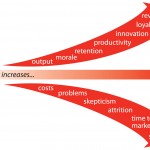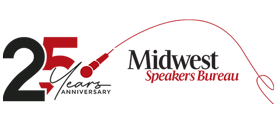What is bigger than the fiscal crisis ever was? We are in a trust crisis, and organizations are slow to realize the bottom line implications. From massive fraud in business to scandals in politics and athletics, the headlines point to a persistent problem of modern life and business — we’re lacking in trust.
Trust is becoming an elusive asset. A recent Gallup poll shows that America’s confidence in nearly every major societal institution is declining. Pull out any newspaper and you’ll see countless examples of how trust is violated every day. Collectively, we no longer trust major corporations, banks, government, the media, public schools, nor organized religion. Doing business in this suspicious climate is extraordinarily difficult, and the degree to which people trust you and your organization is quite literally the difference between success and failure.
If you think trust is just a “soft skill,” consider the impact of Tiger Woods’ behavior off the golf course, which lost him millions of dollars in just a matter of weeks. One breach of trust at Penn State University could cost them $1 billion over the next decade. If you have a loan on your home, your mortgage payment is based on your credit score, which is essentially a trust score. The more the bank trusts you, the higher the score, and the less you pay over the course of the loan. Trust impacts the bottom line.
Trust is consistently delivering what is promised. It cannot be built overnight. It requires time effort, diligence and character. Trust is like a forest-a long time to grow, but easily burned down with any touch of carelessness. With diligence, effort, time and character you can dig a deep level of trust. Take a brief look at history and you’ll see that the unique commonality of the most successful leaders and organization of all time is trust.
My graduate research proved that trust affects the bottom line and impact of an organization more than anything. It also revealed eight unique traits that were common to the most trusted leaders and organizations. I call these traits pillars because they hold up the greatest advantage of all time, something we have come to call the Trust Edge.
• Clarity: People trust the clear and mistrust the ambiguous.
• Compassion: People put faith in those who care beyond themselves.
• Character: People notice those who do what is right over what is easy.
• Competency: People have confidence in those who stay fresh, relevant, and capable.
• Commitment: People believe in those who stand through adversity.
• Connection: People want to follow, buy from, and be around friends.
• Contribution: People immediately respond to results.
• Consistency: People love to see the little things done consistently.All of these pillars are the core to being a trusted individual or organization. Without consistency these pillars do not matter. Let’s take clarity for example. Your organization can have a very clear effective vision and mission, but if you’re not sharing it at least every 30 days consistently then your team does not know it. It is the same with commitment, you can make a promise to lose 50 lbs. in five months, but if you are not consistently following an eating plan and exercising, by the end of five months, your results won’t be what you hoped.
If you want to be effective in these 8 pillars, try the 90-Day Quick Planning (90DQP). It gives an actionable framework that provides clarity, and leads to tangible results. Pick one or two things in your life or organization, then ask and answer four questions. It should only take 1 hour and should be performed every 90 days.
Question 1: Where are we? If you don’t know where you are today, you can’t know where you would like to be in the future. In 20 minutes you should be able to identify strengths, weaknesses, opportunities and threats quickly.
Question 2: Where are we going? Where would you like to be in 90 days? Would you like to be back to your high school weight, double sales or reach 100 more customers? Make it clear and quantifiable.
Question 3: Why are we going? If the why is strong enough, the plan does not need to be perfect. If a building is burning and my kid is in it, I don’t need to know every detail-I’m going in because the why is so strong. If your why is strong enough, then you or your team will stay passionate, motivated and focused.
Question 4: How are we going to get there? Why? I was doing consulting for health care executives group. After the day of training and consulting, they decided the issue they needed to address most urgently was clarity. They discussed what they would do to be clearer. The first answer was: “We will communicate more.” I wondered what they meant. So I asked, how? They kept coming up with answers that had no specific actions tied to them. To get to the place you need to be, you must keep asking how? until your team or yourself commit to taking specific actions. If people don’t ask how? until they will do something different today or tomorrow, it doesn’t matter. Keep asking HOW? until you are absolutely specific about an action item you or your team will start implementing today or tomorrow.
A lack of trust really is your biggest expense. To enjoy the trust edge in your life or organization you must be consistent in each pillar. You might start with the Clarity Pillar by doing the 90-Day Quick-Plan.

Every time trust increases just a little bit, so does output, morale, retention, productivity, innovation, loyalty and revenue. When trust goes down, costs and time to get anything done go down while skepticism and attrition go up. By earning The Trust Edge, people and organizations will gain a significant advantage that extends far beyond the bottom line—even in a crisis!
David Horsager, MA, CSP, is an award-winning speaker, bestselling author, producer, and business strategist who has researched and spoken on the bottom-line impact of trust across four continents. He is the author of The Trust Edge: How Top Leaders Gain Faster Results, Deeper Relationships, and a Stronger Bottom Line (Free Press, 2012). Get free resources and more at www.DavidHorsager.com and www.TheTrustEdge.com.
For more information on David Horsager visit http://www.speakernow.com/espeakers/18578/David-Horsager.html

